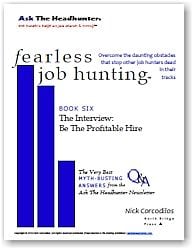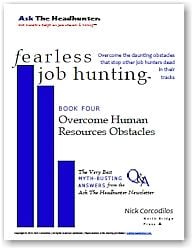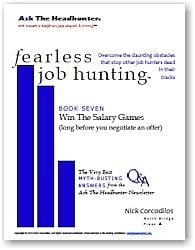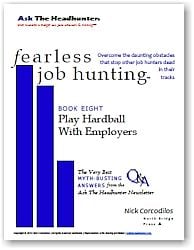In the October 23, 2018 Ask The Headhunter Newsletter we discuss why employers who won’t let you call hiring managers aren’t worth working for.
Question
I’m resistant to add another job board service because I’m already neck deep in Ohiomeansjobs.com (Monster) and Indeed and LinkedIn Premium. I don’t want to kill an additional hour each day on ZipRecruiter with no results, only a barrage of new spam.
Is it acceptable to bypass the standardized job boards and HR resume processing, to seek a direct communication with the company? By acceptable, I mean will it hurt my standing with the hiring facilitators?
Say I’ve applied to a company via a job board or via its corporate application system. Can I then reach out directly to the local hiring manager to start a conversation, effectively reducing the risk of being eliminated from a job search simply because I don’t have the right keywords in my resume? Perhaps if I can gain an audience directly, I will be able to impress them beyond the written resume.
Nearly all job posts to which I’ve applied include language such as “No phone calls please.” On one hand, if I contact the company directly I would be in violation of those instructions from the employer. On the other hand, I may lose an opportunity if I don’t reach out to a manager who may actually appreciate my initiative. After all, if leadership is all about developing relationships, how better to lead than to reach out directly to the local management?
As a hiring manager myself for many years, I had no problems calling or speaking to prospective candidates, even if it was to let them down. To me, that responsibility was simply part of being in management. However, I’ve not been a candidate myself since 1996 so I’m clueless as to whether hiring managers today are open to direct contact. Thanks for your insights.
Nick’s Reply
A good article presents a premise and evidence that supports a conclusion. I’m going to offer some conclusions, then discuss my thoughts, and ask readers to explore the premises and provide the evidence that back up my conclusions — or explain why my conclusions are incorrect. Otherwise, what’s a community like this for?
Call the hiring managers
Here are my conclusions:
- Employers that prohibit job applicants from contacting hiring managers aren’t worth applying to.
- HR departments that rely on automated applicant screening are creating fake talent shortages.
- Managers who won’t take your call are missing the best hires.
- Job seekers who obey such rules are doomed.
Employers and the U.S. Department of Labor claim there’s not enough talent in our country. (See B.S. on the job numbers euphoria.) They say that’s why many jobs remain unfilled.
Bull.
I’m convinced jobs remain vacant because employers won’t let job applicants and hiring managers talk to one another. The intrusion of HR and automated recruiting systems makes a mess of hiring.
You illustrate the classic case of employers who are desperate to hire but nonetheless warn good candidates not to contact anyone at the company by phone and not to contact managers at all.
What’s that all about?
Employers: If you’re hiring, answer the phone!
A company that can’t find the talent it needs should drop everything and welcome calls from job seekers who find the company. Of course, managers should not waste time with the wrong applicants — but that’s a problem that comes with the territory. If you’re looking for the right person to date, don’t close the door on everyone because a few frogs show up!
Managers who are desperate to hire cannot afford not to take all calls. If they’re going to route such calls to a bank of greenhorn personnel jockeys who filter the good applicants from the wrong applicants, then good applicants will be lost. Jobs will remain vacant because personnel jockeys are simply not qualified to vet engineers, marketers, accountants or other expert workers.
Sorry about the wasted time, but it comes with the territory. The best person to recognize the rare, right candidate is the hiring manager.
Turn off the fire hose!
So what should employers do to reduce the noise of wrong applicants? That is, the scads of inappropriate candidates who are a waste of time? It’s simple: Turn off the fire hose! Don’t advertise job openings where scads of the wrong people will see them!
That’s right: Dimwitted employers should stop posting job ads on the likes of ZipRecruiter and Indeed, which are in the business of flooding companies with poorly vetted candidates.
“We send you only the right candidates!” Yah, right — a database is matching keywords and sending me everybody with the word “engineer” in their profile!
Employers must stop posting job ads everywhere. They must turn off the fire hose of applicants. That’s how to save time, so managers have more time to field calls from serious professionals.
Job Seekers: Break the rules
As a job seeker, you must use your own good judgement, but my advice is to always go around obstacles an employer sets up. If calling a manager gets you into trouble, then you know the company effectively locks its managers out of the recruiting process. What kind of way is that to run a company? Either HR has too much power, or managers don’t want to be involved in finding talent.
If you get caught trying to talk directly with a manager and breaking their rules about calling managers… “What rules? I don’t search for jobs online, so I didn’t see any rules. I called an [engineering] manager because I’m an [engineer].”
Be worth talking to
When you contact managers, don’t send a resume or apply for a job. That way, you’re not breaking HR’s rules! Tell managers you’re doing research and considering applying for a job there – but only after you’ve had a chance to judge the company and its management.
But don’t blow it by asking for a job the way HR asks thousands of people to submit resumes! Introduce yourself very briefly and accurately. [Fill in your own job.]
- “I’m an engineer with expertise in [this], [this] and [this].”
- “I’d like to work on [that].”
- “I’m carefully searching for an [engineering] department that [fits this general description] — but I have not yet decided where to apply for a job.”
Ask two or three intelligent questions that reveal your interest in this manager and this company.
- Can the manager give you a little insight about the company’s [marketing] department?
- What are the most important challenges the manager needs good workers to tackle?
- What advice would she give a [nurse] like you about working there?
Judge every employer
The answers you get will tell you whether good managers run the operation, or whether it’s run by bureaucrats who leave important jobs vacant. A good manager will always take a minute to chat with a professional from their community.
A good manager will thank you and welcome a conversation to talk shop. But, don’t you dare just call to talk about your resume and to say you want a job! Be prepared to talk intelligently about the manager’s work!
Then judge the employer by whether they welcome you or shun you. (See 5 rules to test for the best job opportunities.)
Look for relationships
Employers reject most applicants every day because Indeed sends them loads of wrong candidates. Smart job seekers should reject employers who bar phone calls to their managers. Pursue only the ones that clearly indicate they respect relationships and want to talk with other professionals in their field.
As you note, management is about building relationships. It’s not about diddling databases! You’ve got the right idea. Trust your gut.
Turn The Tables: Reject employers
When you encounter rules like, “We’re hiring, but don’t you dare call our managers!”, ignore them. Go around. Call the managers anyway.
You know that if you apply online to 100 companies they will all likely reject you. So why subject yourself to rejection? Subject employers to rejection instead. Invest that same effort carefully selecting employers and hiring managers. Call them to discuss their work intelligently in a short call.
If the managers won’t talk to you — reject the company. Hang up.
Don’t appease them. Move on to the next. You need just one manager who welcomes a serious [marketer, engineer, accountant, etc.] that’s ready to talk shop for a few minutes. You need just one manager who breaks the rules and really wants to fill a job you can do. (See: Smart Hiring: A manager who respects applicants.)
Dare to call hiring managers directly.
Please go back and review my four conclusions at the beginning of this column, about calling managers directly. Are they correct? What’s the evidence from your experience? What premises lead to these conclusions? If you disagree, please explain why.
: :



 I dunno — maybe we should start Job Seekers Anonymous? It’s time we worked up a way to address employers who claim to want “exceptional talent” but expect you to turn off your talent and apply-for-jobs-by-numbers.
I dunno — maybe we should start Job Seekers Anonymous? It’s time we worked up a way to address employers who claim to want “exceptional talent” but expect you to turn off your talent and apply-for-jobs-by-numbers. “Hi, I’m Bill, a seasoned pro in [your field]. I’m interested in working for your company because it’s a shining light in our industry. But I’m puzzled by something. As a very busy [programmer, marketer, whatever] I don’t have time to waste with impersonal cattle-calls and online job forms, so I’m surprised your company is advertising rather than recruiting only the right people thoughtfully. I select potential employers very carefully. I’m ready to meet with your [marketing manager] to show how I can do the job to bring more profit to your bottom line.
“Hi, I’m Bill, a seasoned pro in [your field]. I’m interested in working for your company because it’s a shining light in our industry. But I’m puzzled by something. As a very busy [programmer, marketer, whatever] I don’t have time to waste with impersonal cattle-calls and online job forms, so I’m surprised your company is advertising rather than recruiting only the right people thoughtfully. I select potential employers very carefully. I’m ready to meet with your [marketing manager] to show how I can do the job to bring more profit to your bottom line.
 This has always been a hot topic, mainly because employers just won’t stop asking for information that’s none of their business. Even if HR managers swear up and down that they need your salary data “because that’s our policy,” we all know why they really want it: It gives them an edge on job offer negotiations.
This has always been a hot topic, mainly because employers just won’t stop asking for information that’s none of their business. Even if HR managers swear up and down that they need your salary data “because that’s our policy,” we all know why they really want it: It gives them an edge on job offer negotiations. I’ve been a loyal reader of your blog for about eight or nine years. I grew up in real tough circumstances on the streets of Detroit and as time went by I left that life and became an artist. I went west to Seattle where I became moderately successful with my music and was able to support myself by learning carpentry and eventually running my own business. I did this all without any formal education or training, but I worked my tail off.
I’ve been a loyal reader of your blog for about eight or nine years. I grew up in real tough circumstances on the streets of Detroit and as time went by I left that life and became an artist. I went west to Seattle where I became moderately successful with my music and was able to support myself by learning carpentry and eventually running my own business. I did this all without any formal education or training, but I worked my tail off. Employers are so out of it that they’re not only putting up digital roadblocks against people they’re trying to attract — such as online application forms and
Employers are so out of it that they’re not only putting up digital roadblocks against people they’re trying to attract — such as online application forms and  This cannot be reconciled with the idea that an employer is trying to attract you. When you’re an abstraction in a database — a mess of keywords — the assumption is that you’re to be avoided and feared, either as a waste of time or, in this case, as a physical threat.
This cannot be reconciled with the idea that an employer is trying to attract you. When you’re an abstraction in a database — a mess of keywords — the assumption is that you’re to be avoided and feared, either as a waste of time or, in this case, as a physical threat. What would you do if you were interested in a position that clearly states:
What would you do if you were interested in a position that clearly states:





